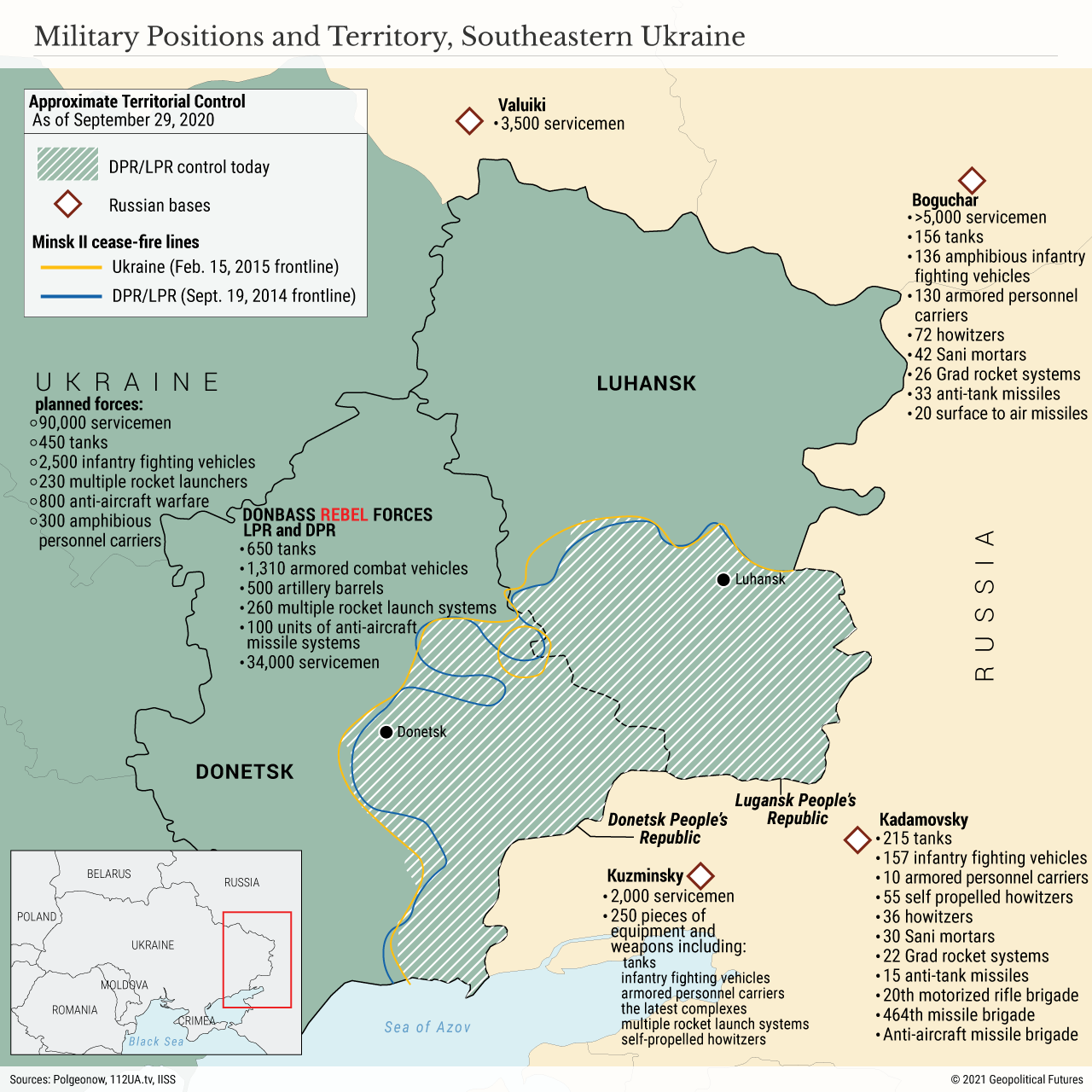By Ekaterina Zolotova
Fighting has resumed between the Ukrainian military and Russian-backed rebels in Donbass who accused the government in Kyiv of preparing for a large-scale offensive. Troops in the region were, indeed, put on high alert, and when asked, a representative to the peace talks said Kyiv would not rule out the possibility of war. To be clear, Ukraine has reason to want to provoke Russia. Doing so would perhaps breathe life back into the talks for implementing the Minsk Agreement, which was signed back in 2015. Kyiv wants to bring the United States into the talks, and Russia’s participation in some kinetic activity in Donbass, Kyiv figures, might do the trick. After all, the events in southeastern Ukraine are not just a Ukrainian problem or even a European problem but a truly global problem, or so argues Ukraine.
What’s more, the government there is extremely unstable. President Volodymyr Zelensky’s popularity is falling. Only about 22 percent of Ukrainians said they would vote for him in 2021. Pandemic-induced economic damage only makes matters worse. Demonizing Russia – even potentially drawing it into a conflict in which Kyiv can accuse it of being the aggressor – would be a welcome distraction. Ukraine hopes that this, too, might tempt Washington to insert itself more into the conflict. It would need to be a short and decisive conflict, but played the right way it could really benefit Kyiv.
And yet, war is very unlikely to break out. Rumors that Ukraine wants revenge for Donbass have circulated for years, but even now a full-fledged war there is unlikely. A successful operation would need to be sudden and would need to take place before or after the spring thaw. It would also require a substantial number of ground forces supported by a substantial number of bases supplied by substantial amounts of food, weapons, etc. The events of the past week were hardly a secret, and there’s no evidence that a large number of troops or tanks is being massed near the region as you’d expected them to be. According to the self-proclaimed Donetsk People’s Republic, Ukraine has deployed a total of 33 units of military equipment and weapons near residential buildings and municipal facilities in the area of Donbass controlled by Kyiv, but this is not enough to win a war. Moreover, rebels in Donbass are well provisioned and practice constant combat readiness, so there’s no reason to believe a conflict would be short-lived.
Geopolitically, a war is a tough sell too because the balance of power in the region hasn’t changed much. Yes, there’s been a lot of additional training and equipment in Ukraine courtesy of the U.S. and NATO, and yes, Ukraine is trying to improve its combat readiness, including the planned construction of two military bases according to NATO standards in Severodonetsk, the center of the Luhansk region, and in Mariupol in the Donetsk region. But the United States is happy with the status quo, which allows Washington to be present without spending too much and without locking horns directly with Russia.
Russia, however, is in a tougher position. President Vladimir Putin has said that Russia will not abandon Donbass easily, even if it prefers to observe and take action only when absolutely necessary – i.e. the beginning of a military operation. It’s why Russia recently issued hundreds of passports to residents there, and it’s why it has such a robust military presence in its Southern and Western Military Districts. And make no mistake: Militarily, Moscow could easily take direct possession of Donbass if it wanted to. Not only does it have troops and bases near the Ukraine border, but it is building more. The Ministry of Defense is constructing a base for military equipment and more than 5,000 people in the city of Boguchar, 45 kilometers (30 miles) from the Ukrainian border. Another base is being built near the town of Valuiki. The nearest bases to Donbass, which would be the first to join the battle, are about 50 kilometers away, so the troops can be transferred to Donetsk and Luhansk pretty quickly.
But formally annexing another of 50-150 kilometers of territory wouldn’t really add to its strategic depth – keeping the conflict frozen accomplishes that already. Hence why Moscow doesn’t object to recognizing Donetsk and Luhansk as part of Ukraine, albeit as autonomous regions, under the Minsk Agreement. Donbass is important to Russia only as a buffer zone.
Ukraine, on the other hand, is much more important. Moscow sees it as the demarcation between Russia and NATO countries. It’s a former Soviet republic with close cultural ties, one that has continued to serve as a transit hub for energy, Russia’s economic cash cow, to European markets. All a military operation would do is push Ukraine to NATO more quickly and invite a military response. At the very least, it would warrant additional sanctions that Moscow simply cannot afford.
Even so, the Kremlin realizes that the Donbass issue must be resolved as soon as possible, since Ukraine continues to build up its military forces while falling further into political instability. It is much more profitable for Kyiv to simply heat up the situation without starting a war, which it could very well lose. Everyone stands a better chance of strengthening their positions through protests, provocations and politicking through the Normandy talks.

No comments:
Post a Comment